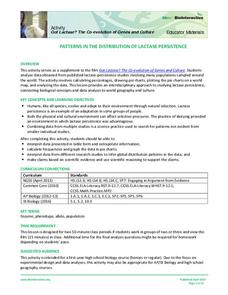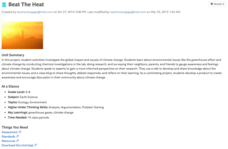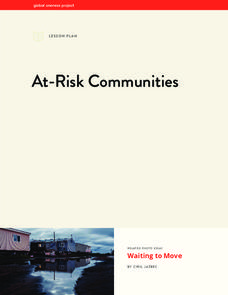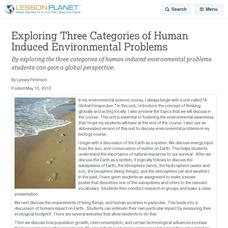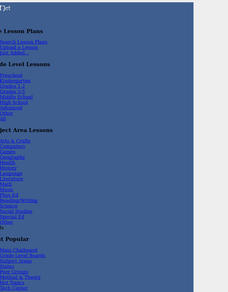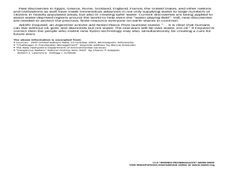Curated OER
Rice: The Global Crop
Students understand the uniqueness of the rice plant and how it grows. Students compare rice growing in Indonesia and California, observing the steps common to the process everywhere. Students comprehend the concepts labor-intensive and...
Practical Action
Climate Change - Who's In Control?
How can both individuals and governments respond to climate change and take responsibility to reduce its effects on our environment? Here you will find three lessons filled with discussion, debate, and role-playing...
SRI International
The Water Crisis
Water, water, everywhere, right? Wrong. Learners assess their own knowledge of water availability on Earth. Then, through a reading, a teacher-led presentation, and an activity, pupils learn about the importance of available clean...
Global Oneness Project
Communities on the Threshold of Change
Viewers of the short documentary Santa Cruz Del Islote consider how changes in climate and overfishing impact the life style of the 1,200 residents of a small island off the coast of Cartagena, Columbia.
Howard Hughes Medical Institute
Patterns in the Distribution of Lactase Persistence
We all drink milk as babies, so why can't we all drink it as adults? Examine the trend in lactase production on the world-wide scale as science scholars analyze and interpret data. Groups create pie charts from the data, place them on a...
Intel
Beat the Heat
Explore greenhouse effect and climate change through a 15-day unit. Scholars learn about these STEM concepts by researching, conducting surveys, experimenting, and collaborating with experts in the field. They frequently communicate...
Global Oneness Project
At-Risk Communities
"Waiting to Move," a photo essay by Ciril Jazbec, brings into sharp focus the threats posed by climate change. Class members examine images of Shishmaref Island and the Native Alaskan Inupiate coastal villages that are impacted by rising...
Curated OER
Water Everywhere: Is There Enough to Drink?
Students examine water supply issues caused by population growth and land use. They read and discuss an article, develop a water usage trivia game, write a news article, illustrate a desalination process, and research aquifer systems.
Curated OER
Endangered Species !: Why Are Species Endangered?
Young scholars explore the various issues and problems faced by endangered species globally. They research the plight of endangered species, create a poster of a selected animal, and present their poster and research to the class.
Curated OER
How Many Birds Would It Take To Keep A Jackal Alive?
Students examine the role of large families in some animal populations. They work together to complete an activity related to food supply. They discover the relationship between preys and predators.
Curated OER
New Way to Produce Biofuels
Students identify global issues in the world today. They explore the vocabulary related to the issues and design a poster for a campaign to deal with one of the global issues they identified. Worksheet and answer key provided.
Curated OER
Sharks in Decline
Learners investigate common fishing methods used to capture sharks. They decide why these methods and the shark's reproductive biology are contributing to the quick reduction in the shark population.
Curated OER
Tracking Narwhals in Greenland The Ocean Unicorn
Students study the ecology, habitats, geographic range and feeding habits of narwhals. They determine at least three reasons for the decline in the narwhal populations and complete the accompanying worksheets.
Curated OER
They're more evolved that way
Learners explore the notion of local evolution, or genetic selectivity among different continent-based human populations. They consider specific examples of local evolution, such as lactose tolerance, skin color, and cognitive capacity,...
Curated OER
Exploring Three Categories of Human Induced Environmental Problems
By exploring the three categories of human-induced environmental problems students can gain a global perspective.
Curated OER
The Black Plague: International Insects
Sixth graders research conditions that caused 16th Century Black Plague and led to downfall of Europe, and examine causes and effects of population density, disease, and invention.
Curated OER
The Way of Water in the World
High schoolers explore problems and design solutions in relation to water issues. In this interdisciplinary lesson plan, students play an interactive game in order to explore global water issues to create solutions for the water problems...
Curated OER
First Contact
Sixth graders have an opportunity to enhance their computer skills by using Internet as a resource tool and a vehicle for global interaction with other students.
Curated OER
See You Later, Alligator
Students explore the historical and social significance of animals as cultural symbols in various countries around the world, as well as the impact that humans have made on the population and natural habitats of these animals.
Curated OER
The Gray Whale Obstacle Course Viewing Guide
Students complete a worksheet while watching a film about whales. They examine the human impact on whale migration and identify adaptations the whale has acquired in able to survive. They discover how global warming has effected the...
Curated OER
Everything You Do Makes a Difference
Students choose a current environmental issue and research historical conditions as well as present conditions. They assess
the changes in ecosystems, populations of specific species, air quality, or any other aspect of an ecosystem.
Curated OER
Hydro-Technology
Students create a design for water collection, sanitation, or supply. In this hydro-technology lesson, students learn about the global water crisis. Groups of students read water technology articles, draw or design a device or process,...
Curated OER
Greenhouse Gases: The Chemistry Behind the Culprits
Ninth graders investigate the effect of different gases in the atmosphere. In this chemistry lesson plan, 9th graders explain how these gases contribute to global warming. They suggest possible solutions to this growing problem.
Curated OER
Harvesting the New World: Changing Land Uses and Contact Between Cultures in Colonial Times
Ninth graders differentiate the Native American and European values. For this world history lesson, 9th graders define colonialism in their own words. They study the effects of epidemics and other diseases to Native American populations.






